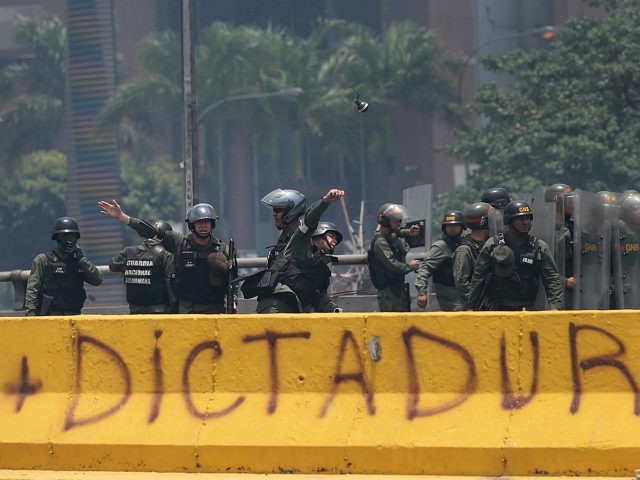Venezuela gave its dictator Nicólas Maduro a cold welcome upon his return from Cuba Tuesday. A mob shouting insults at the head of state attacked his motorcade at a military event in eastern Bolívar state, pelting his car with eggs and rocks.
“The people have taken to the streets to greet and support President Maduro,” Venezuela’s state television anchor can be heard saying on national airwaves during the live broadcast Tuesday night, as projectiles fly in the air and barely miss Maduro himself. Towards the end of the video, Maduro’s security appears to be pushing protesters off of his car before the signal abruptly ends.
In video apparently taken from the ground, the projectiles appear more numerous, and a woman can be heard shouting, “damn you!” at the motorcade. Some individuals appear to nearly get close enough to Maduro to punch him.
Reports on social media from Venezuela identified the projectiles as rocks and eggs
Five individuals were arrested for the revolt, all young men between the ages of fifteen and twenty, accused of hurling “sharp objects” at the head of state. The videos do not seem to show knives or any objects of that nature in the air, however, and the protester clearly audible in one video is a woman.
Maduro was in San Félix, Bolívar, to observe the 200th anniversary of a battle there for the independence of the nation. The Venezuelan newspaper El Nacional notes that San Félix was once a reliable chavista socialist stronghold that has rebelled after years of police brutality against what were then small protests that have since grown.
“Bolívar state, especially San Félix, has been hit hard by the government,” local journalist Clavel Rangel told the newspaper. “Five years ago, this used to be the solid bastion of chavismo.” Rangel noted that the region was suffering the food and water shortages sweeping the nation as much as any other region, however, having documented three deaths of children in recent memory due to malnutrition.
“In a city between rivers, there is no water,” he noted. “There are daily protests for all sorts of services.”
Maduro drove himself home to Caracas Tuesday night, according to a video on his Twitter account. He has since left Venezuela yet again for the tropical nation of St. Vincent and the Grenadines, which he described as “brothers in cooperation and solidarity.”
Maduro was in Havana Tuesday for a meeting of the Bolivarian Alliance for the Peoples of Our America (ALBA), a group created by the radical leftist governments of Venezuela and Cuba as a vehicle to control leftist messaging throughout Latin America. Maduro delivered an hour-and-a-half-long speech condemning, among other things, U.S. President Donald Trump, “imperialism,” an unspecified “coup d’etat” plot against him, and the historical European slave trade.
The ALBA released a statement supporting Maduro against growing protests against him, which have intensified in the past month.
In addition to the San Félix incident, Venezuelans around the country took the streets Tuesday night, from the capital Caracas to the far-west San Cristóbal. Protester demanded the restoration of legislative powers to the National Assembly – which the Supreme Court claimed to do, but legislators still found themselves unable to serve after a ruling invalidated their powers – and the reversal of a decree banning opposition leader Henrique Capriles Radonski from running for office for the next fifteen years.
Capriles has run against Maduro for president twice and currently serves as the governor of Miranda.
The NGO Venezuela Penal Forum estimates that nearly 300 individuals were arrested between April 4 and April 10 during peaceful protests attacked by government guards; 134 of them remain behind bars. The NGO has confirmed some of these protests to be politically motivated, adding at least eight to the count of prisoners of conscience in the South American nation.
Two young student protesters have died this week during government crackdowns on protests, and an 87-year-old woman died in her home, asphyxiated by tear gas. There is no indication the woman was participating in the protests.

COMMENTS
Please let us know if you're having issues with commenting.